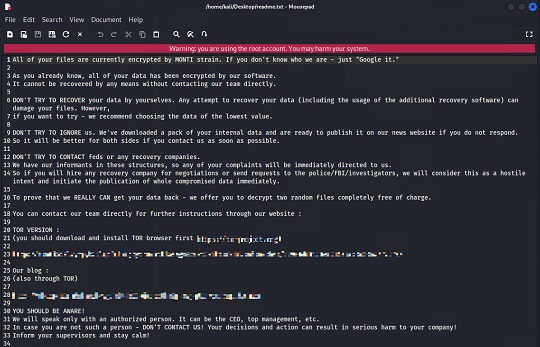Ransom.Linux.MONTI.THGOCBC
ELF:Filecoder-FB [Ransom] (AVAST)
Windows


Threat Type: Ransomware
Destructiveness: No
Encrypted:
In the wild: Yes
OVERVIEW
This Ransomware arrives on a system as a file dropped by other malware or as a file downloaded unknowingly by users when visiting malicious sites.
It avoids encrypting files with the following file extensions.
TECHNICAL DETAILS
Arrival Details
This Ransomware arrives on a system as a file dropped by other malware or as a file downloaded unknowingly by users when visiting malicious sites.
Other Details
This Ransomware does the following:
- It encrypts all files except for the avoided filename and extension.
- It modifies the contents of the following and replaces the ransomnote text:
- "/etc/motd"
- "/usr/lib/vmware/hostd/docroot/index.html"
It accepts the following parameters:
- --path
Path to file (required) [--path /vmfs/volumes] - --whitelist
List of VM's that i need to skip [--whitelist /wltxt] - --vmkill Whether to kill the virtual machine
- --detach Detach from the screen
Ransomware Routine
This Ransomware avoids encrypting files with the following strings in their file name:
- readme.txt
It appends the following extension to the file name of the encrypted files:
- .monti
It leaves text files that serve as ransom notes containing the following text:
- {Encrypted Directory}\readme.txt

It avoids encrypting files with the following file extensions:
- .monti
- .sf
SOLUTION
Step 1
Scan your computer with your Trend Micro product to delete files detected as Ransom.Linux.MONTI.THGOCBC. If the detected files have already been cleaned, deleted, or quarantined by your Trend Micro product, no further step is required. You may opt to simply delete the quarantined files. Please check the following Trend Micro Support pages for more information:
Step 2
Restore encrypted files from backup.
Did this description help? Tell us how we did.


